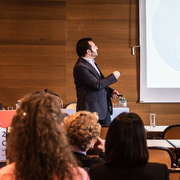
Choose a channel
Check out the different Progress in Mind content channels.

Progress in Mind











The depth of depression in some of our patients is not well captured by MADRS and HAM-D. Even when the scores are high. Though we do use them, they do not necessarily capture the full depth of depression of emotion in some patients. Lots of emotional information is lost. Perhaps this is too much to ask of a questionnaire! But you can get the information by talking and, above all, listening. It’s about empathy.
And that’s what I try and do. Of course, it’s time consuming. But if I am on call and not too busy, I go to the acute unit and sit and talk to patients. We talk about anything – what they’re watching on TV, politics, religion, football. What they think about the world. What they think about their therapies. Anything that moves them.
I use both drugs and psychotherapy – Acceptance and Commitment Therapy (ACT). If you are anxious or depressed, most of the time you hide. You avoid things. And if you do that, slowly but inevitably, your life becomes empty. And if your life is empty it is impossible to recover from depression.
The therapy is about accepting the fact that you may not be able to control your thoughts and the feelings that come with them. But you can control your actions and the values and direction of your life. The commitment is to act according to your values to rebuild your life. To approach once again your family, your health.
I use this therapy in combination with antidepressant drugs. Ours is a private hospital, so patients are paying. And part of our job is to make sure they get the most effective combination of treatment that is possible.
Dr Jose Antonio Aguado of the Hospital Benito Menni, Valladolid, Spain, talks about his approach to the management of depression and the importance of combined treatment.